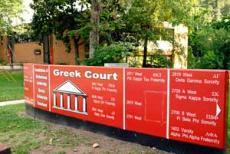Years before University planners had broken ground on the first buildings on Centennial Campus, slowly transforming Western Boulevard into the new dividing line of N.C. State’s expanding sprawl, Fraternity Court sat isolated.
The horseshoe-shaped road, which now provides space for 15 chapter houses, was strangely left out of the greater vision of the University.
Then, according to Associate Vice Chancellor for Student Affairs Tim Luckadoo, came a stroke of “dumb luck.”
The construction on Centennial Campus and the recent moves by several campus departments, he said, transformed an area once in the sticks to residential real estate nestled between what is fast becoming two major elements of campus. It’s one of the reasons that makes Fraternity Court, also referred to as Greek Court, ripe for future redevelopment.
“Now, it’s prime property,” Luckadoo, chair of the Greek Court Redevelopment Task Force said. “You couldn’t find a better place.”
Chancellor James L. Oblinger convened the 18-member task force to examine the possibility of expanding and improving the court.
According to Luckadoo, the driving push behind the task force’s mission is the creation of a land lease option, which would give fraternities and sororities on the court the option of leasing land from the University to initiate the construction of their own house, paid for by the chapter itself.
In this case, land lease options work when the state treats Greek chapters as nonprofit organizations working on behalf of the University, Luckadoo said. Because the organizations do not generate income, state laws permit them to lease the land on a 40-year basis, most often at a price of $1 a year.
“We can’t give it to them for free,” Luckadoo said.
Through this process, a group called an alumni house corporation, set up through a fraternity or sorority’s national chapter, builds, maintains and manages the house. The University still owns the land, and in some cases the fraternity or sorority may contract our services, like janitorial or landscape, through the school.
While Greek organizations retain equity on the property, the University is not without its own side benefits, Luckadoo said.
“It’s 40 beds the University doesn’t have to maintain,” he said. “We in effect are getting free housing.”
The idea of a land lease has been “batted around” for 40 or 50 years, according to John Mountz, director of Greek Life.
“This whole process is meshing nicely with the University’s update of the physical master plan,” Mountz said. “That south area of campus has never been looked at from a master plan standpoint.”
And that’s another thing members of the task force hope to change.
According to Luckadoo, one of the major problems with the court as it stands is there is no “sense of community.”
“One of the things that has changed is the overall philosophy of land design,” he said. “Architects looked at the world differently in the 60s.”
With future expansion of the court, which may include demolishing five un-renovated houses on the court and extensive landscaping among other things, according to the task force’s vision statement, there could be more gathering places and more opportunities for campus living.
“It would feel like a community and not just a place to sleep at night,” Luckadoo said.
Andrea Atwell, president of the Panhellenic Association and member of Zeta Tau Alpha, said this sense of community is one of the major concerns of students as well, pointing out the importance of drawing in students from all over the University.
“We’re not trying to bring in every student. We’re just trying to build a better community,” the senior in political science said.
The task force is basing its discussion around a similar concept the Department of Greek Life at the University of South Carolina implemented.
“The idea is to transform Greek Court into something of the future,” Luckadoo said.
Although the task force only began meeting in May, the group has already entertained a variety of options for the area, including seven different site design plans created by participants in a planning charrette June 24.
But despite all the plans, Luckadoo pointed out there’s no pot of money available yet, especially after Greek Life spent $8 million on recent renovations to some of the houses. He said because the process is at so preliminary a stage, there aren’t even estimates of how much the redevelopment might cost.
“Some alumni may see this as an attractive opportunity to redevelop the court,” he said.
And that’s precisely the point, according to Mountz. An opportunity like this for growth and expansion, he said, may attract alumni to form stronger bonds with current students.
He used the USC model as an example, citing a dramatic increase in alumni involvement.
“They’re all intrigued and interested to see how this pans out,” Mountz said.
Alumni involvement, especially through organizations like alumni house corporations, may also take the weight off some strained chapters, who attempt to manage house finances on top of their typical duties.
“You’ve got undergraduate officers trying to run it all,” Mountz said. “That’s stuff alumni are supposed to do.”
Despite all the proposals for the revitalization of Fraternity Court, Atwell said she doubts any of it will draw her sorority back on campus.
ZTA’s own alumni house corporation financed the construction of a chapter house in the early 90s.
“We paid a lot less money and ended up getting a much better house,” she said. “If they do build this new Greek Court then I think we’ll get the worse end of the deal.”
But that doesn’t mean she isn’t interested. She said she and her sorority will continue to be involved in the process to bring “a different set of heads to the table.”
“We’re all pretty excited because [Greek Court] looks a hundred times nicer, but we’re kind of wondering if it will actually happen,” she said.








